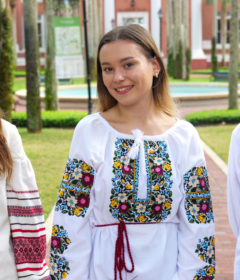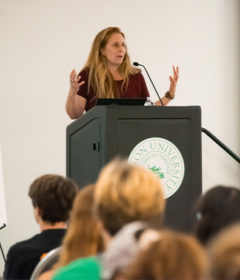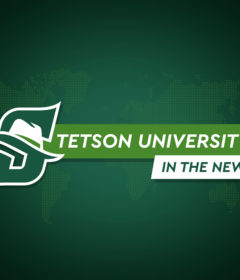President’s Campus Climate Webinar Details Survey Results
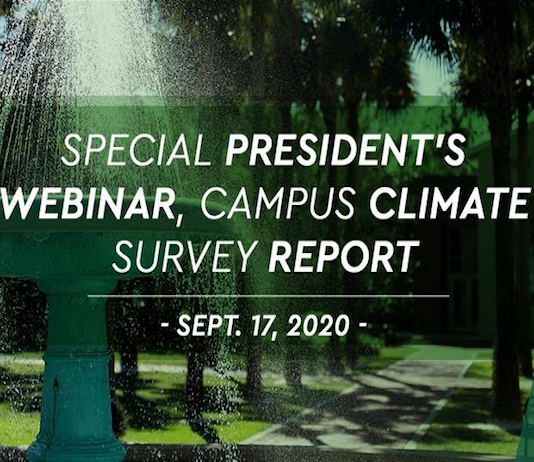
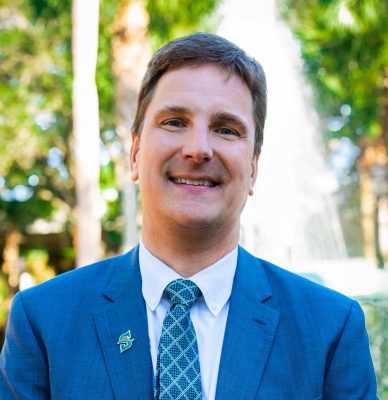
Kindness. Empathy. Agency.
On Sept. 17, Stetson President Christopher F. Roellke, PhD, began his weekly webinar, this one titled Campus Climate Survey Report, emphasizing those three words.
“I firmly believe those qualities are critical to us as we move forward and will often be difficult conversations about our campus climate,” Roellke said. “We want to be able to have the agency to build not only on our strengths, but also on the things that are revealed to us in terms of some challenges that we have that lie ahead.”
Roellke then turned to John Pryor, CEO of Pryor Education Insights, to share the results of Stetson’s Campus Climate Survey. Webinar panelists also included Lua Hancock, vice president of Campus Life and Student Success, and Michèle Alexandre, dean of Stetson’s College of Law.
From Feb. 3 to March 14, Stetson conducted a 2020 Campus Climate Survey of students, faculty and staff at its DeLand campus, as well as a Campus Climate Survey for the College of Law in Gulfport and Tampa Law Center. The 2020 surveys are a follow-up to the original Campus Climate Survey conducted by Stetson in 2016, predominantly asking the same questions to allow for comparison.
The new survey was conducted by Pryor Education Insights, a national higher education research firm, and results have been compiled into two reports. Each report is accompanied by an executive summary: DeLand and College of Law.
A report on the survey findings was sent to members of the Stetson community on Sept. 3, with the results providing a snapshot in time, according to university officials — showing how students, faculty and staff experience their education and social life, teaching and research, and jobs and careers at Stetson.
The Presidential cabinet, including various groups on campus, had selected Pryor to assist with data collection, analysis and summarization. With more than 25 years of experience, Pryor served as the director of Student Affairs at Dartmouth from 1992 to 2005 and served as director of the Higher Education Research Institute, Cooperative Institutional Research Program (known as HERI) for nearly a decade.
All totaled, 57% of faculty responded to the survey, followed by 51% of staff/administration and 30% of undergraduates.
Briefly, among the findings, as cited by Pryor, students were the most comfortable, with 87% of the undergraduate student population indicating they were “comfortable” or “very comfortable” with the campus climate. Approximately two‑thirds of faculty and staff said they were comfortable/very comfortable.
In terms of workplace environment, 22% of staff reported they “strongly agree” that Stetson is a good place to work; another 64% of staff agreed Stetson is a good place to work. Meanwhile, 82% of faculty thought Stetson was a good place to work, and 26% strongly agreed with that statement.
According to Pryor, there “definitely was an issue with socioeconomic status,” including the perception of Stetson being most positive for people of high socioeconomic status, as well as most negatively rated for people of low socioeconomic status. Similarly, the climate for people of various political affiliations also was seen as less positive. And there were other issues.
So, as the work continues in addressing the campus climate, there are concerns.
“To harp back on John [Pryor’s] general opinion and takeaways, I think we have learned a lot about the importance of communicating with each other with respect, no matter what,” Alexandre commented. “So, I think that’s what I’d like to start with — the idea of the call for respect that John Pryor, an external individual, has put in front of us and what that means for us. And second, we need to trust the process and collaborate with that effort of respect to see where it may lead us.”
Much work still lies ahead, Hancock affirmed.
She noted, “Here are questions that came in this the past few days: How do we up lift our students from historically marginalized communities? How do we ensure that all faculty and staff voices are centered while we do this work? We typically see the same students, faculty and staff serving on committees and working groups, how can we ensure better representation in the post‑survey subgroups?
“I would say if anything makes me hopeful, it is that we have done some hard work over the past six months with this community, with faculty, with staff, with students, with the administration, with subgroups that are those where we have cut budgets. We’ve made super hard decisions about the community’s health, and I have been extremely impressed with the way that we have spoken to each other, and the way we have worked together — because at the end of the day, we wanted the safest and most amazing community that respected learning and safety for our students, our faculty, our staff, our administrators, our hourly employees as we could this semester.”
Roellke concluded the webinar with these parting words: “We have to stay at the table with openness, honesty, candor, and again with kindness and empathy. I think if we practice these things and bring this disposition to this work, we will move this institution on very important metrics on inclusivity and diversity. I believe this so strongly.”
Next President’s Weekly Webinar: The State of COVID-19 at Stetson
Join President Christopher F. Roellke, PhD, for his weekly update webinar on Thursday, Sept. 24, 1-2 p.m. Roellke will be joined by Lorenzo Brown, president and CEO of AdventHealth DeLand, and Dr. Joe Smith, chief medical officer, to discuss the current status of testing, planning, student safety and tiers at Stetson and in the community. Roellke also will be joined by Michèle Alexandre, dean of the College of Law, and Lynn Schoenberg, dean of Students and co-chair of the Safer Campus Task Force.
Time Change
The time has been changed to 1-2 p.m. to allow for greater employee participation. Supervisors are encouraged to provide employees the 1-2 p.m. time period to participate during work hours while maintaining university operations.
Panelists:
- President Christopher F. Roellke, PhD
- Lorenzo Brown, President and CEO of AdventHealth DeLand
- Dr. Joe Smith, Chief Medical Officer, AdventHealth DeLand
- Michèle Alexandre, Dean, College of Law
- Lynn Schoenberg, Dean of Students, Co-Chair, Safer Campus Task Force
Thursday, Sept. 24, 1-2 p.m.
Register for the webinar now.
Students, faculty and staff can submit suggestions and questions through this online form.

